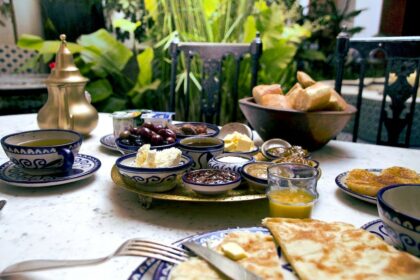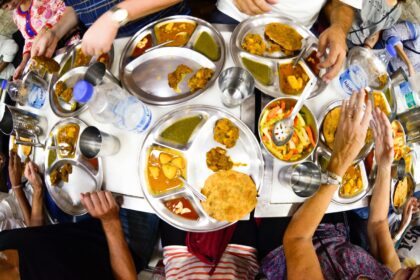By Nick Wall. This is an edited excerpt from Nick’s book, “Around the World in 575 Songs: Africa: Traditional Music from all the World’s Countries – Volume 2“.
Gambian music and West African storytelling traditions no doubt play a huge role in why travelers are drawn to this of the Earth.
The beauty of this music is due in no small part to the magical sound of the 21-string harp, the kora.
And nowhere is the art of kora music more revered than in Brikama, a small town in the smallest country on mainland Africa.
Psst – Don’t forget to pin this post for later!
What Is A Griot & Why Are They Important To Gambian Music?
Master kora players, or jalis, are a world apart from rock stars.
They’re griots:
The poets, singers, and historians of the Mandinka people.
They’re inheritors of a tradition which has run in their family for centuries, and the knowledge of this instills in them a humbleness and a sense of responsibility.
Griots see themselves not just as performers, but as teachers to the next generation.
Gambian Music: Exploring West African Storytelling & Oral Traditions Click To TweetMasters Of Griot Music In Gambia Culture
Two important masters of the kora instrument are Alhaji Bai Konteh (born 1920) and Amadu Bansang Jobarteh (born 1915).
Bai Konteh’s father, kora player Ibrahima Konteh, brought up his family in Jambur, where Bai Konteh lived for many years before relocating his family to the nearby town of Brikama.
In the 1970s Bai Konteh became well known across the Gambia for his radio broadcasts, and also made a real impact on the world scene, touring the USA and Canada several times, appearing at the Newport Jazz Festival, the New Orleans Jazz Festival, and the Philadelphia Folk Festival.
Jobarteh’s father was Fili Jobarteh who emigrated from Mali taking his family with him and settled in the town of Bansang.
There the son started to learn the kora instrument, his first teacher being his elder brother Bala (grandfather of the great Malian jali Toumani Diabaté).
Though less well-known internationally, the prestige and influence of Amadu Bansang Jobarteh in the griot community was second to none.
The most successful of Bai Konteh’s many children was Dembo Konteh, who lives in the family compound in Brikama to this day.
His recordings with Kausu Kuyateh are true African classics.
The trailblazing world music presenter Charlie Gillett wrote:
“Nothing is ever quite the same after the first time you hear a kora played live in a West African setting. Dembo Konte was the musician who opened my ears, and he made these recordings with Kausu Kuyateh soon afterward. They still sound powerful and raw, evocative and timeless.”
The only word there I’d question is “timeless”.
Their collaborations have the character of a dazzling improvisation as the two koras weave their intricate rhythms and you hear in the vocals something of the natural way that the two men interact with one another.

The Changing World Of The Griot & West African Storytelling
Last summer, news came from Brikama that Kausu Kuyateh had passed away.
Ian Anderson, who had worked with him as a producer, led the tributes:
“Kausu was a fantastic musician, reinventing not only ways of playing the kora but the instrument itself with extra bass strings. And a lovely man with an impish sense of humor. Dembo passed in 2014 and now both are gone. Feels like the end of an era.”
Malamini Jobarteh (who also left this world not long since) was a nephew of Bai Konteh.
After the death of his parents, he came to live on the Konteh compound with his two wives and their children.
He came to regard Bai Konteh as his father, and often performed and recorded with Dembo.
Tata Dindin Jobarteh is Melamini’s elder son and Pa Bobo is the younger.
Tata Dindin’s teacher was Alhaji Bai Konte himself.
The young student though followed his own path, going on to study under one of The Gambia’s most celebrated musicians, Jaliba Kuyateh, who encouraged him to explore different styles.
In The Gambia, he formed a band called Salam which included an amplified kora, electric guitars, and Western-style drum set, alongside the traditional Mandinka drums.
Tata Dindin, Pa Bobo and Jaliba Kuyateh are all leading innovators who’ve fused Mandinka music with other styles while remaining passionate defenders of their musical heritage.
Griot Music In 2018
I challenge you to find a poor album made by a Gambian griot.
Even when the music itself isn’t very traditional they bring to it this metaphysical relationship which they have with their instruments.
Gambian Music: Exploring West African Storytelling & Oral Traditions Click To TweetHere, for instance, is Juldeh Camara’s account of how his award-winning collaboration with English guitarist Justin Adams came about:
“A friend gave me a copy of Justin’s CD and I took it with me in the Gambia. When I got there I was playing the riti and trying to follow what he was playing. I was feeling it in my body. When I got to the UK, I got his number and called him. I said, ‘I heard your stuff. This style you play is very, very connected with my spirit.’ Then over the phone, Camara whipped out a few licks on his riti and the kologo… and Adams went crazy on the other end of the line. They were soon jamming and recording together.”

Sona Jabarteh & The Modernization Of Griot
Sona Jobarteh believes that each instrument has its own aura and that her own, the kora, is a very male instrument.
This sense guides her in the way that she plays.
Another innovator with the art of Kora music is Dembo’s son, Jali Bakary Konteh, who released his debut album Konteh Kunda in 2010.
Do you explore music when you #travel? Here is why you need to in The #Gambia. Click To TweetThough the kora very much takes center stage, this is a heavily produced album and the variety of effects make the tracks sound much more distinct than on a traditional kora CD.
The album’s title is significant:
Jali Bakary is in the process of building a solar-powered music school in Brikama.
His collaborator is a Californian musician, Steve Pile, who not only fell in love with the sound of the kora but felt compelled to travel to The Gambia and learn to play the KoRA instrument under the expert tutelage of Jali Bakary.
“I was Jali’s first student, but certainly not his last. In fact, the universal spirit of musical adventure has led hundreds of people from all over the world to Jali’s home at Konteh Kunda since our first lessons. It is a large compound, in various stages of disrepair. The poverty rate in The Gambia is 58%, and you can see this reflected in the upkeep on the compound. However, Jali is always happy to give up his bed for a budding kora student from abroad, and his generosity has inspired me to give something back.”
The History of Sona Jobarteh
Sona Jobarteh, the granddaughter of Amadu Bansang Jobarteh, was born in London but was born into the tradition:
Music, she tells me, was something that was instilled from birth, encouraged at every step.
She was just a small child when she played with Amadu Bansang for the first time. At the age of 17, she decided that she wanted to follow in her grandfather’s footsteps.
Did her father, Sanjally, I wondered, have any qualms about her studying the kora? There had never been a female kora master in her long family history.
No.
He saw that she was passionate and was happy for her to follow her chosen path.
Sona studied at the Royal College of Music, expanding her musical knowledge.
Her 2011 solo album Fasiya was based around traditional Gambian culture gave her an international profile and invitations to perform around the world.
However, of all the plaudits she received by far the most important to her was that of her father, recognizing that she’d become a master of her instrument.
The Significance Of Griot In African Tradition
Even more important to her though than any form of personal reward is her teaching.
Sona is conscious of being a bearer of a tradition that goes back hundreds of years:
If she can plant seeds among the next generation then she’ll have achieved something really durable.
In The Gambia now, she says, there is a gap:
As a result of social changes and some griot jalis going to live in Europe and North America, the old families have broken up, the family compounds where tradition was once taught have mostly fallen silent.
On the positive side though, there is still a thirst for traditional Gambian music.
After several years’ work by Sanjally and Sona, the Amadu Bansang Jobarteh School of Music, the first specialist music school of its type in The Gambia, opened its doors to its first full-time students in early 2016.
This is now Sona’s main focus when she is not touring, and what all the tour proceeds go towards:
The school needs to raise funds so that it can offer scholarships to students of poor backgrounds.

Dembo Jobarteh was a nephew of Amadu Bansang Jobarteh who released four albums between 2001 and 2005.
All his albums are home recorded:
“I want to show you my country, our music. Pure, like we make it at home. No technicalities to sweeten our voices, no fusion with other styles. No tricks to make it commercial.”
The Legacy of Dembo Jobarteh
Dembo was a manager at the Gambian Griot School of Music and Dance where he teaches kora and Mandinka drums.
Before he could realize his dream of living in the USA, in 2008 he died of malaria aged 31.
I’ll leave the last word to him:
“Many people can learn to play the kora. But to play like a griot (jeli) is a gift from God and, as we say in West Africa, also a gift from the devils. If they like you, they will teach you.
When I am alone at night I play this instrument especially for them.
Life is there to enjoy.
But to do so you need to be healthy.
Therefore I advise people to take good care of their body and their mind and to forget about self-interest.
If you share what you’ve got, you’ll improve your own life and that of others. Then you will truly enjoy life.
Yes, I like to tell people what is important in life. It is a family tradition. If I did not live according to tradition, I would miss the life that was meant for me.”
Enjoyed this post? Pin it for later!
PIN
Have you experienced the beauty of Gambian music and West African storytelling?
About The Author
Nick spent five years researching, writing, and self-publishing his four-volume world music book while working full time as a civil servant. For thirty odd years, he’d read widely about the history of different countries during spells of political activism, and flirted with an interest in world music. Now he returned to the music with a fresh critical eye and found that he had more to learn than he could ever have imagined.
Nick is now embarking on another, more personal project: in 2019 he will become a she and will adopt the name Linda Wall.
Note:
This article is an edited extract from “Around the World in 575 Songs: Traditional music from all the world’s countries” Volume 2 Africa (Politically correct press 2018).
*Featured image via Craig Adderley/Pexels








Hey NICK WALL ! I read about Gambian Music. I learned a lot from it. I rally like it .The way of your writing is very amazing and impressive. You write such a quality article.Its very interesting. I will also share it with all my friends…..keep posting.
Hi NICK you wrote such a quality post of information related to gambian music. I am using Spotify which i found ver cool and awesome app. Such a good piece of new information which will help young folks like me to manage their music according to modern era technology. I will love to share it with my friends.